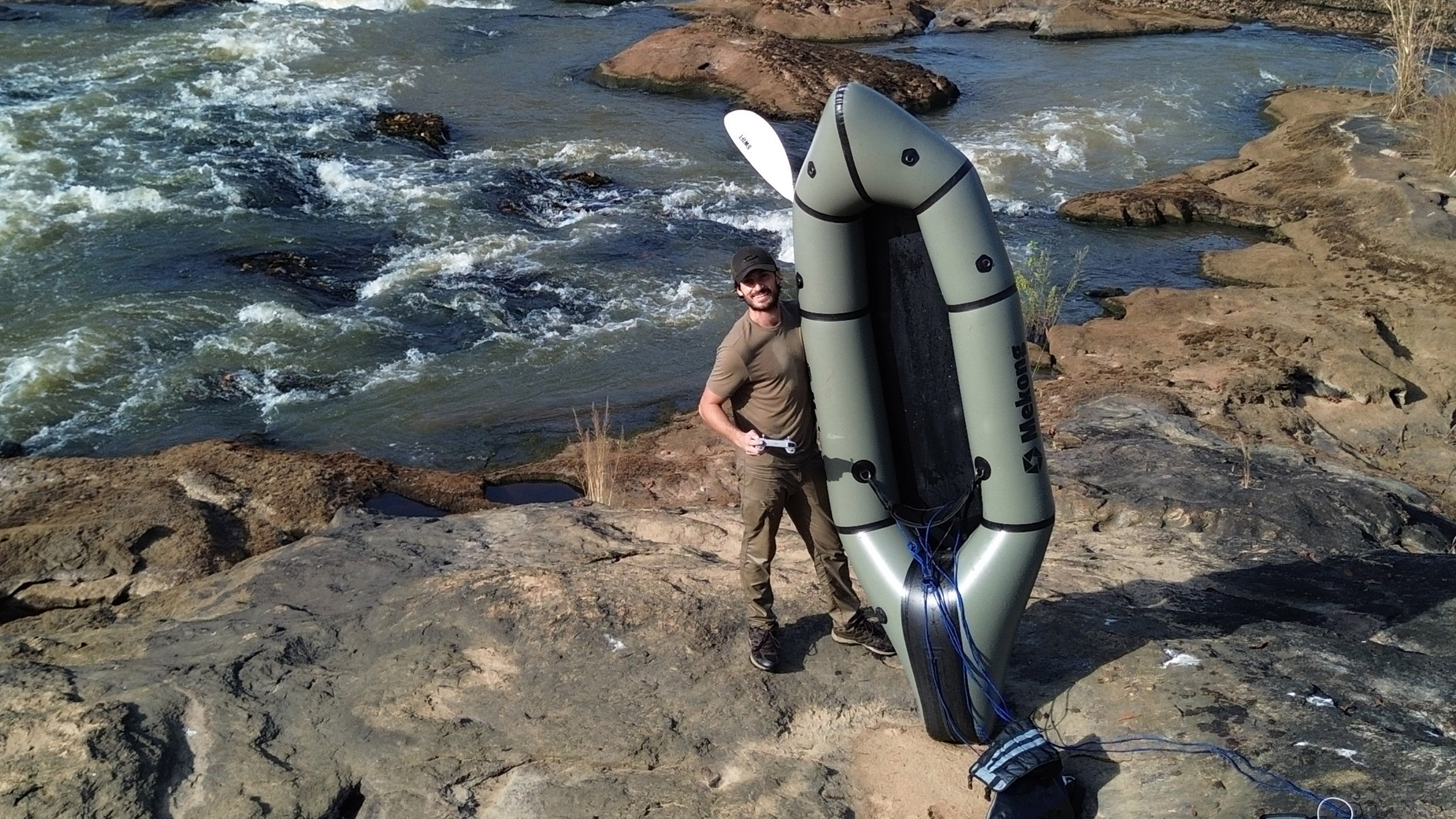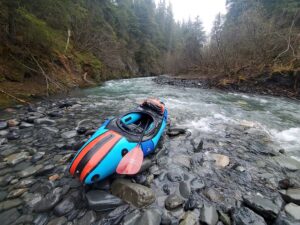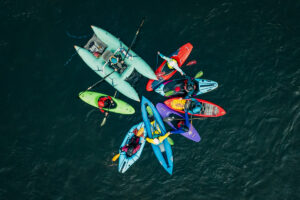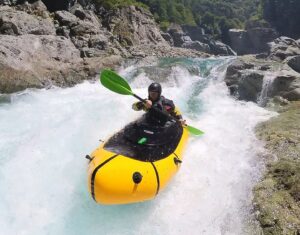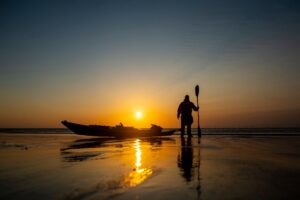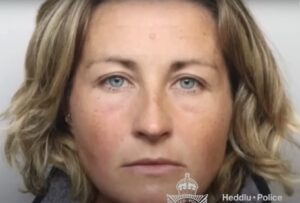It was partway through Thomas Mariee’s 17-day solo packrafting descent of Sierra Leone’s Rokel River, and he was hiding in the jungle.
Mariee had set up camp at dusk, hoping to conceal his presence from the illegal gold miners operating on the river. As he huddled in his tent, he listened to their voices as they conducted their work in the dark. Eventually, he slept.
Sierra Leone’s military officials had repeatedly warned Mariee to stay away from the miners. But this 60km stretch of river between Bumbuna and Magburaka was full of them. Their mining machines stretched out into the water, sometimes as many as five on one section of the Rokel.
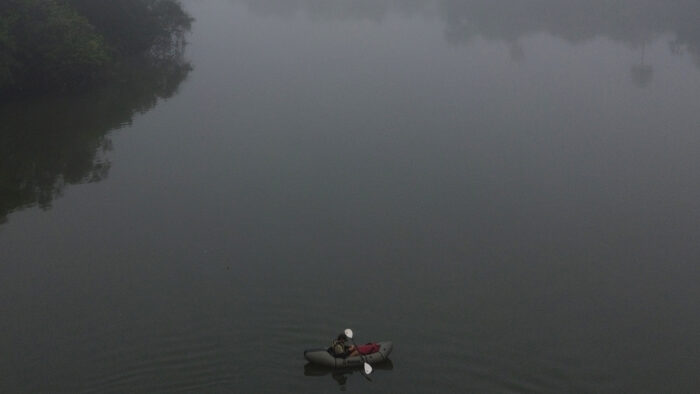
The Rokel is the largest river in Sierra Leone. Photo: Thomas Mariee
That meant Mariee had to paddle closer to the miners than he’d like, and earlier that day, some of them had thrown stones at him. By paddling until dark and then setting up a stealth camp, Mariee hoped to avoid another uncomfortable confrontation.
But the discomfort, when it came, arrived in the form of wildlife rather than humans.
Waking up at 2:00 am, Mariee felt a stinging sensation. Sitting up, he flipped on his headlamp and looked at his arms. They were covered in biting red ants. He directed his light at the floor of his tent to find it was swarming with insects. In the dark, he’d set up his tent directly on an ant mound, and they’d wasted no time in chewing through the fabric and making their way into Mariee’s domain.
“It was a carpet of ants. Hundreds and hundreds of ants,” he remembered. “It was a nightmare. I was feeling pain everywhere over my body. I had to go out of my tent, clean everything. It was very cold. At this moment, I have to be honest with you, I was wondering, ‘Why am I not chilling with my friends in Côte d’Ivoire right now?'”
This moment of Mariee’s 365km packraft journey down Sierra Leone’s largest river stands out to the adventurer because of its contrast. In hiding from humans, he’d placed himself at nature’s mercurial mercy instead.
Comfort zone
A Frenchman with four years of experience living in West Africa, Mariee had been looking for a way to get further outside his adventuring comfort zone. Before the Rokel descent, he’d been experimenting with longer and longer paddling journeys on some of Africa’s smaller rivers and taken some whitewater classes in France.
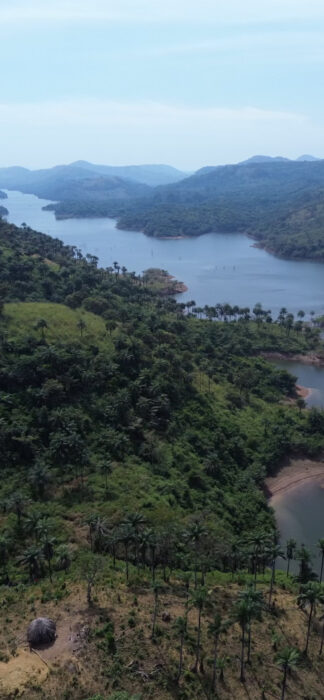
The Rokel. Photo: Thomas Mariee
Pouring over maps and satellite imagery, he chose the Rokel in the dry season as his target. In Mariee’s eyes, it was perfect. Sierra Leone is a non-French-speaking country, which would force him to get by in English and whatever Krio (the country’s dominant ethnic language) he could pick up. The whitewater would be intense enough to stretch his relatively fresh skills and widely dispersed enough that he could portage around anything he couldn’t handle.
And it would be a chance to experience a culture of hospitality and kindness often obscured behind the very real threat of violence in some African countries.
A realization
Mariee slipped his Mekong George All Well packraft into the Rokel at the first navigable stretch near the Guinean border. His goal was the Sierra Leone River Estuary on the Atlantic Ocean. His only food supply was a large bag of rice, which chose specifically because of its status as a staple food along the waterway.
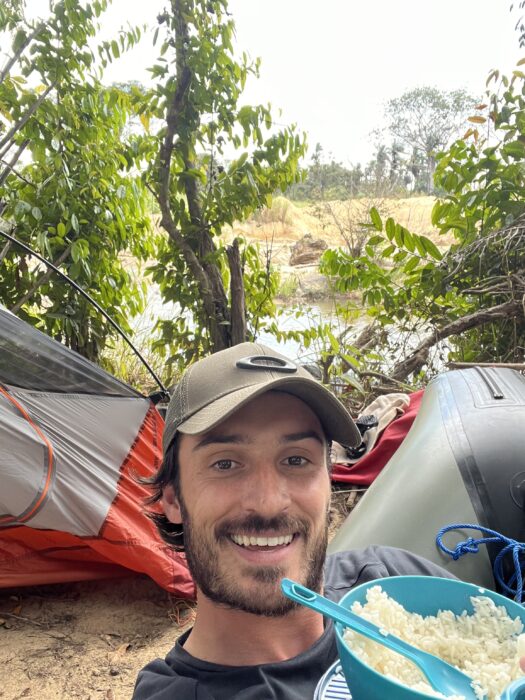
Rice for dinner. And breakfast. And lunch. Photo: Thomas Mariee
In the expedition’s early days along the more isolated section of the river, he mostly slept in his tent. The river’s upper section was swift and roiling with more rapids than Mariee’s satellite research had suggested. In the first few days, the rafter did more portaging than boating.
“That was when I realized how arduous the trip was going to be,” he said.
Mariee’s solo adventuring style is cautious and well-informed by his multi-year residency in Côte d’Ivoire (Ivory Coast). He probably could have run many of the rapids he chose to portage around, but he knew that a capsize would be real trouble along the remote stretch he was paddling. So he gutted it out, sweating heavily in the humid days and then shivering as the night air turned cold.
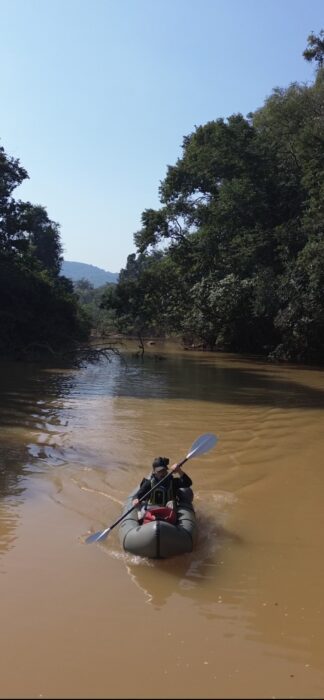
Photo: Thomas Mariee
After the Rokel flattened out, he paddled more. And as a bonus, as the river progressed, he was able to spend more evenings in villages, occasionally supplementing his rice diet with fruit or cans of sardines he bought from village residents.
“The concept of tourists does not exist. So I had to justify my presence. The village elders would ask me, ‘Are you a missionary? Are you a gold miner?’ So I had to show them photos, videos that I was truly a tourist. And once I had convinced them, they were most welcoming,” he said.
It wasn’t until Mariee reached the portion between Bumbuna and Magburaka, with its illegal gold mining operations, that he felt any real danger.
Lessons learned
Despite his caution in other areas, Mariee neglected to bring a satellite phone or messaging device, a decision he regrets. He’ll definitely bring one along on his next expedition, he told ExplorersWeb.
The only other significant gear issue he encountered was his water filter, which clogged and became non-functional halfway through the expedition. He boiled his water from then on, and was happy to report he ended his expedition with no notable gastrointestinal issues.
However, going to the doctor a few weeks after completion, he discovered he had a staph infection on his leg, the result of a small scrape he’d been unable to tend carefully enough. So on his next adventure, he’s also going to seriously upgrade his first aid supplies.
Mariee isn’t too concerned about making first descents or setting records. He adventures for its own sake and also, he says, to shed light on the hospitality and kindness of the people he meets along the way.
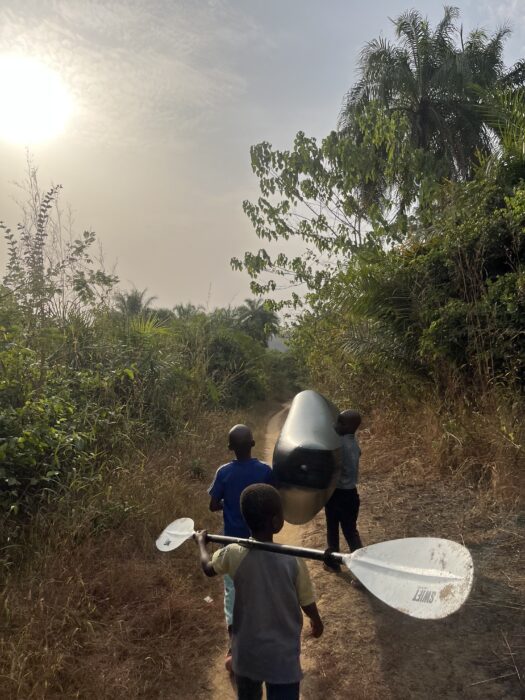
Photo: Thomas Mariee
“There are huge issues in Sierra Leone, we have to be honest about it. But still at the end, we’re talking about welcoming someone who is traveling. I didn’t have any issues, people were very, very welcoming. They were not in a good situation, but they were still helping me.”
Mariee secretly left cash behind when he stayed in a village — tucked under something because people often wouldn’t accept it if he offered. He also got in the habit of giving away his gear in thanks for kindness, finishing his trip with neither shoes nor headlamp.
Madagascar and beyond
Two days after completing his descent of the Rokel, he was still happy not to be paddling. But by day three, he was daydreaming about his next expedition. He’s planning something that features more balanced quantities of packrafting and trekking.
“I would love to cross Madagascar from east to west or west to east. That would require maybe 25 days. You have the Mangoky River, which is the largest river in the country. And that would allow me to packraft in the western section, but I would still have to walk to get there.”
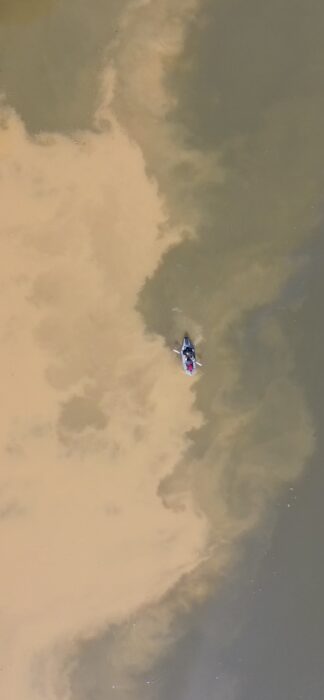
Photo: Thomas Mariee
And in the next four or five years, he has his sights set on the Congo River.
“In terms of exploration, it’s the most fascinating one, the most mysterious one, maybe also the most dangerous one. I know only one crazy guy has paddled it from source to sea,” he said. “So I’m not talking about a performance, being the first one. No. It’s just about living the adventure I’ve always dreamed of.”
